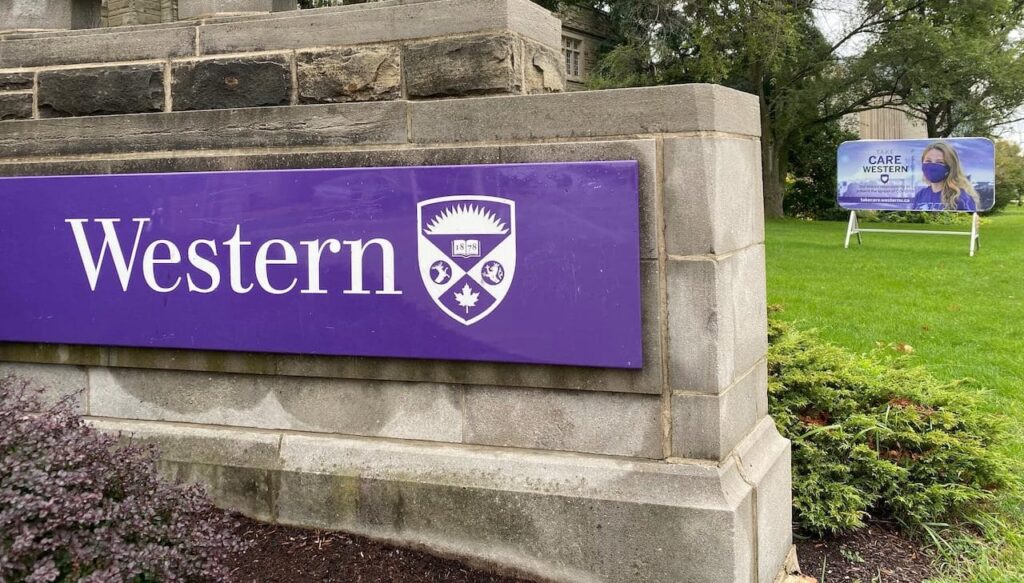The University of Western Ontario is home to Western Law – one of the most prominent Ontario and Canadian legal education providers. In this overview, you will learn about strengths, scholarship support, tuition fees, admission criteria and statistics, and the curriculum of this law degree.
Law School Summary
Below you will find what makes this Canadian legal institution different from others.
Strengths of Western Law School
Western University Law promotes a syllabus of over 100 law modules, with particularly strong teaching in courses, such as:
- Business;
- Criminal;
- Intellectual Property;
- International Law; and
- Labour and Employment.
2-Year Senior Status LLB in the UK is popular among many Canadian students.
Western Law can also boast with its 50 clubs and committees under its Law Society and a modern Library with over 190,000 volumes and 45,000 microforms. Apart from that, its students often find themselves training in the following legal clinics:
- The Community Legal Services;
- The Dispute Resolution Centre;
- The Western Business Law Clinic;
- The Sport Solution Clinic;
- The Pro Bono Students Canada;
- The Tort Law Research Group; and
- The Public Law Research Group
Furthermore, Western’s standout moment for practical law experience is its Western Law Internship Program lasting close to four months. Students are subsidized between $10,000-$15,000 CDN to intern at governmental structures, law firms, and other corporations. This allows them to gain exposure to International, Trade, Business, and Environmental law practices.
Special Qualities of Western Law School
Western derives its uniqueness from introducing first-year law students in groups of 22-25 students to the curriculum – this is known as the so-called ‘Small Group Program’.
In attempting to support Western law students with their quest of securing post-graduation employment, the Careers Service Centre hosts an annual Careers Conference. Whereas the Faculty of Law regularly invites law scholars and professors from around the globe. Nobel prize winners and important public personnel (e.g. an ex-U.S. Treasury Secretary and the Delaware Supreme Court Chief Justice) often give career-enhancing talks.
Western partners with these law firms to organize Law Mooting competitions and work placements:
- Borden Ladner Gervais LLP;
- Chaitons LLP;
- Lerners LLP; and
- Torys LLP.
Lastly, the University of Western Ontario Faculty of Law annually supports international exchanges with law schools across Scandinavia and the rest of Europe, the UK, India, Southeast Asia, Australia, New Zealand, the USA, and Quebec.
Western Law Admissions
All of the required documents have to be submitted by November 1. The only deadline extending into the calendar intake year is the LSAT (the final completion month is January).
Personal Statement
Western University Law School requires candidates to produce two pieces of writing totaling 7,000 characters as part of their application.
- In Part A, applicants can outline why they would be a good pick for the University and what drives them to study law by utilizing the limit of 5,000 characters.
- Part B offers 2,000 characters to answer a situational task, e.g. describing how one overcame a particular challenge.
There is a third section, Part C, available exclusively to Access or Indigenous applicants. Applicants can describe how their academic/LSAT scores may have been impaired or what communal involvement they possess, respectively, within a character boundary of 1,000.
LSAT and GPA
The University of Western Ontario Faculty of Law has been explicit that successful applicants score above the 80th percentile on the LSAT (161 points at the minimum) and receive a GPA of at least 3.7.
Letters of Reference
Western also mandates candidates to present two letters of reference, either two academic or a combination of an academic and an objective non-academic one verifying your professional skills. Two non-academic references are expected by Mature candidates, although endeavouring to obtain an academic one will suffice this criterium better.
Undergraduate Degree
Any undergraduate degree can be taken in order to receive eligibility to apply to the Juris Doctor program.
Enrolment Statistics
At present, Western’s Law school tutors 534 students. Unlike other law schools in British Columbia and Ontario, we are able to track the denouement of the Law Faculty’s admission and enrolment rates.
In 2017, the Admissions Committee screened 2,152 applications, of which only 173 people secured places in Year One of the Juris Doctor program. Thus, Western Law acceptance rate is 8% admission. Later, statistics from 2021 followed a marginal increase in the number of applications and filled places: 2,174 and 190, respectively, hence leading to a mere jump in the admission rate: 8.7%.
In 2021, 190 individuals of 2,779 applicants were able to pronounce themselves as incoming law students at Western amid increased competition and a decreasing admission rate of 6.8%
Student Finance Information

Western Law Tuition
This is what tuition and domestic expenses add up to in total for Canadian citizens and overseas students, assuming that both are in full-time education and subject to no scholarship discounts:
| First-year fees (together with ancillary expenses) | $21,803.05 CDN | $42,244.05 CDN |
| Second and Third year fees (per year; ancillary expenses are included) | $21,803.05 CDN | $42,244.05 CDN |
| Estimated textbooks’ costs | $1,460 CDN | $1,460 CDN |
| Application fee | $100 CDN | $100 CDN |
| Additional living expenses per year | $10,000 CDN to $12,000 CDN | $10,000 CDN to $12,000 CDN |
| Three-year total fees | $102,969.15 CDN | $164,292.15 CDN |
Scholarships
The University of Western Ontario Law offers a variety of scholarships for its Juris Doctor program, many of which are subsidized by private individuals and former alumni. The table below is the quickest and most pragmatic method of introducing you the financial aid support for law students.
| Scholarship Criteria | Value Per Scholarship (various donators) |
| Strictly Merit-Based (candidates are selected based on their academic performance in Year One or superb impressions made during the admission process; some scholarships are contingent upon continuous academic success, e.g. the Kevin J. Comeau Continuing Scholarship requiring a minimum GPA average of 80% and an academic performance inside the top 40% of one’s class of upper year students) | $600 CDN to $5,000 CDN; some scholarships have a fund of $40,000 CDN to be distributed to several students |
| Merit and Financial need | $1,500 CDN to $3,200 CDN |
| Merit and Community or Athletic Activities | $5,000 CDN |
| Merit and Extra-Curricular or Public Service | $1,600 CDN to $5,400 CDN |
| Merit, Financial Need, Leadership and Extra-Curricular | $1,500 CDN |
| Financial Need and Community Service | $1,000 CDN |
| Financial Need and Interest or Background in Entrepreneurship | $2,300 CDN |
| Interest or Background in Business and/or Insolvency | $10,000 CDN |
| Financial Need Only | $2,300 CDN |
| Black Students | $1,000 CDN |
| Francophone Students | $10,000 CDN per academic term, up to a total of $40,000 CDN |
| Indigenous Students | $1,500 CDN to $1,750 CDN |
The Curriculum at Western Law
UWO law offers a wide variety of courses. As part of their legal studies, students can explore various areas of law and develop an interest in a range of legal issues.
First-year
Mandatory courses are taught over 30 weeks and some are deliberately tutored in classes of up to 25 students. Compulsory first year courses a worth 36 credits and include:
- Constitutional Law;
- Contracts;
- Criminal Law;
- Property;
- Torts;
- Legal Research, Writing and Advocacy;
- Legal Ethics and Professionalism; and
- Corporate Law.
The Legal Ethics and Professionalism and Corporate Law courses are semi-electives. While both are mandatory, students can choose which one to take first, ultimately leaving the next one for the first semester of Year Two of the Juris Doctor Program.
Second and Third Year
Upper year courses falling under obligatory completion amount to 12 credits and include:
- Administrative Law;
- Civil Procedure;
- Legal Ethics and Professionalism (unless taken in Year One; then the Corporate Law course ought to be chosen); and
- Corporate Law (unless taken in Year One; then the Legal Ethics and Professionalism course ought to be chosen).
Electives
Upper year electives cover a broad spectrum of legal theory and are comprised of:
- Aboriginal Law;
- Advanced Constitutional Law – Charter Rights;
- Advanced Constitutional Law – Federalism;
- Advanced Corporate Law;
- Advanced Criminal Law;
- Advanced Intellectual Property;
- Advanced Restructuring and Insolvency Law;
- Banking Law;
- Bankruptcy and Insolvency Law;
- Biotechnology Law;
- Canadian Human Rights Law;
- Commercial Law;
- Competition Law;
- Corporate Finance;
- Criminal Law Advocacy;
- Criminal Procedure;
- Employment Law;
- Environmental Law;
- Estate Planning;
- Family Law;
- Healthcare Law and Policy;
- Immigration and Refugee Law;
- Insurance Law;
- International Law (different types);
- Law and Sport;
- Media Law;
- Mergers, Acquisitions and Other Changes to Corporate Control;
- Mining Law and Sustainability;
- Municipal Law;
- Negotiation and Mediation;
- Ontario Court of Justice Placement Program;
- Taxation of Corporations and Shareholders;
- The Art of the Deal;
- Trusts; and
- Wills.
In concluding this article, it must be noted that not all the optional modules were listed as their number is substantially lengthy.
Electives are categories under three main categories. Whereby each one has sub-divisional courses and each of these courses integrates several modules in itself, collectively amounting to 346 credits over all modules.
- The first major group of Public Law courses includes Administrative Law, Constitutional Law, Criminal Law, Family Law, Public International Law and Tax Law.
- The Business & Private Law category is comprised of these courses: Commercial & Insolvency Law; Common Law & Equity Law; Corporate Law; Insurance Law; Intellectual Property, Information & Technology Law; International Business Law; Labour Law; Private International Law and Property Law.
- Finally, the Advocacy, Procedural Law, Legal Theory & Speciality classification features: ADR, Competitions, Ethics & Professionalism, Law Language & Literature, Legal History, Legal Theory and Litigation.
More About Western Law
When we are asked to picture London and the River Thames, we make instant associations with the British capital. Contrary to that, you will now be transferred to a different city with the same name in southwestern Ontario.
London nears a metropolitan population of half a million people. It is home to The University of Western Ontario, founded in 1878, and its 28,000 students. Western law library promotes various events and courses that add to the vibrant student life.
The University of Western Ontario Faculty of Law marked its 62nd anniversary in 2021. Its history dates back to the ages when it was led by the Honourable Ivan Cleveland Rand, its first-ever Dean and ‘probably the greatest judge in Canada’s history’ by popular belief.
By Georgi Minchev


